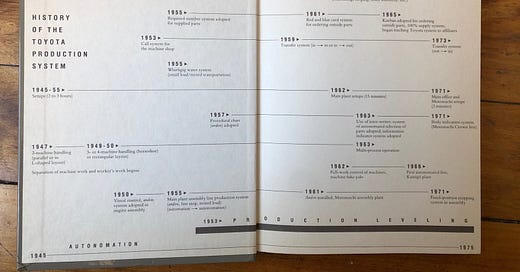Why is this interesting? - The Five Whys Edition
On companies, change, and the challenges of root cause analysis
Noah here. Anyone who has spent any time working with or in big companies can attest to the pendulum pattern that change often takes. The version of this I’ve witnessed most frequently working with big companies is a shift from top-down global management to distributed local power. As someone from a large retailer once said to me, “we are always in a re-org.”
While there are lots of reasons companies change their operating structure and policies—new leadership, market conditions, and even change for change’s sake—in the end, all change is a theory on what it takes to make something perform more effectively (even though the endless re-org can often feel like the opposite). Companies, like people, learn from the past and (ideally) adjust their behavior to encourage or avoid certain situations moving forward.
Why is this interesting?
Why the pendulum, then? If companies (and people) are really learning about what works and doesn’t how come so many suffer from change-related motion sickness? That, I believe, is because while learning may be easy, learning the right thing is hard. This is all the more challenging in giant companies where isolating effects of individual decisions—like a global-led vs local market-led structure—can be particularly difficult to unravel.
The danger, of course, is that if you learn the wrong thing you risk making the wrong change, something you’ll eventually probably have to roll back—another swing of the pendulum. One great-performing local market, to use the earlier example, doesn’t mean all 150 should be running independently, just as one bad quarter probably shouldn’t precipitate wholesale changes. Identifying a cause and understanding its effect are two separate questions.
This kind of learning was baked into the Toyota Production System (TPS), the set of methods that revolutionized manufacturing and defined the car market in the 1970s and 1980s. While there are a number of worthwhile precepts that came out of TPS—the andon cord, muda, mura, muri, and kanban to name a few—my personal favorite is “the five whys:” a stupidly simple approach to doing root cause analysis (since that’s what we are really talking about here).

How simple? Just keep asking why. Here’s how Taiichi Ohno explains it in his 1988 book:
Why did the machine stop?
There was an overload and the fuse blew.Why was there an overload?
The bearing was not sufficiently lubricated.Why was it not lubricated?
The lubrication pump was not pumping sufficiently.Why was it not pumping sufficiently?
The shaft of the pump was worn and rattling.Why was the shaft worn out?
There was no strainer attached and metal scraps got in.
He goes on to explain, “Repeating ‘why’ five times, like this, can help uncover the root problem and correct it… By asking and answering ‘why’ five times, we can get to the real cause of the problem, which is often hidden behind more obvious symptoms.”
Understanding root cause is a required part of making the right kinds of changes, whether they’re small life decisions or massive organizational ones. If you take the wrong things away from an experience, whether good or bad, the risk is that you follow the bad analysis with even worse action. While it’s certainly not the sole reason so many organizations suffer from the pendulum of change, it’s clear that better root-cause analysis using even a method as simple as the “five whys” would help smooth out those cycles. (NRB)
Chart of the Day:
From the excellent Axios Media Trends email by Sara Fischer, number of paid streaming subscriptions by age. (NRB)

Quick Links:
This seems like…not a great sign? “Property executives are unlikely stewards of youthful clothing brands. But Forever 21 is to be subsumed by two of its largest landlords after retail specialists balked at the prospect of reviving the fortunes of the distressed fast-fashion company.” (NRB)
My Ham Radio Contact With International Space Station NA1SS (NRB)
A very comprehensive history of Page Six (CJN)
Thanks for reading,
Noah (NRB) & Colin (CJN)
Why is this interesting? is a daily email from Noah Brier & Colin Nagy (and friends!) about interesting things. If you’ve enjoyed this edition, please consider forwarding it to a friend. If you’re reading it for the first time, consider subscribing (it’s free!).


